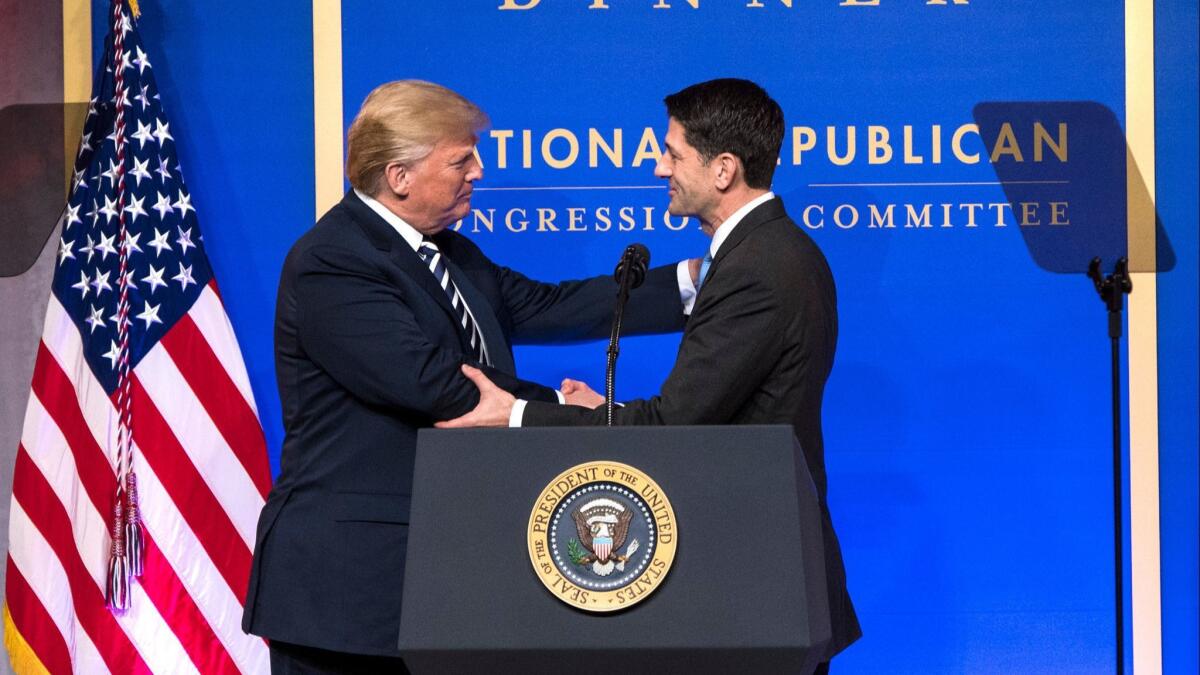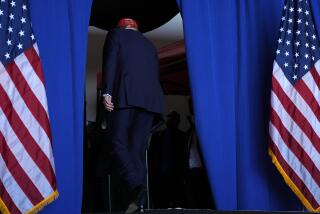Op-Ed: A post-Trump GOP might emerge from a Ryan Underground

- Share via
When Paul Ryan became speaker of the House 30 short months ago, he was a free trader and ardent internationalist. He supported comprehensive immigration reform and believed that the Republican Party should make sincere and ongoing overtures to minority voters. He was fiercely committed to fiscal responsibility and deficit reduction as keys to private sector-driven economic growth. To many, he represented the future of the Republican Party.
Under Trump, Ryan’s GOP no long exists, leaving Republicans singing the old Willie Nelson song, “I’ve Got a Wonderful Future Behind Me.”
President Trump’s version of Republicanism is about wall-building — literally, economically and philosophically — and rejects the optimistic and aspirational policy objectives that drew a generation of young conservatives like Ryan to public service. Trump’s brand of populism is instead fueled by a collection of grievances, resentments and vitriol that blames others for our problems rather than empowering us to overcome them. For the past year-and-a-half, Ryan has struggled to survive in the uncomfortable role of Trump’s accomplice — or the even more uncomfortable role of Trump’s hostage.
Ryan’s emancipation gives the Republican Party an opportunity to build its post-Trump future.
Now he is almost free. And in the long run, Ryan’s emancipation from the president’s cramped and vitriolic narrative gives the Republican Party an opportunity to build its post-Trump future.
In not seeking reelection to Congress, Ryan is implicitly admitting that Republicans are almost certain to lose control of the House after the November elections — and that the only thing worse than being Trump’s apologist as House speaker would be to serve as Trump’s apologist while minority leader. The move was also a tacit acknowledgment that Ryan’s vision for a hopeful and inclusive conservative movement has no place in Trump’s populist GOP, and that Trump’s hostile takeover of the Republican Party is now complete.
Holdouts such as Ohio Gov. John Kasich, Sen. Bob Corker (R-Tenn.) and Sen. Jeff Flake (R-Ariz.) sound increasingly like the scratchy pleas of Radio Free Europe emanating from Soviet-era transistor radios. The Never-Trumpers have long since been defeated. The Trump Resistors have been routed as well.
What’s left — not only for Republicans but for all those who believe that a two-party system benefits democracy — are the After-Trumpers, those survivors who will emerge from the wreckage in 2021 (or less likely, but still plausibly, 2025) to rebuild.
A minority party has a difficult path back to power when it cannot attach tangible policies to their broader principles. The post-Obama Democrats are learning this right now. Still, it was while out of power that both parties shaped their most ambitious ideological transformations in the modern era: Bill Clinton’s New Democrats and Ronald Reagan’s Revolution. Free of the burdens of governance, both parties could be more ideologically adventurous and sharpen their objectives to create a well-defined contrast to a discredited status quo.
Ryan was, once upon a time, considered the boldest conservative policy thinker of his generation. But he has been too closely tethered to Trump and torn between rival factions in the House to fashion a path forward that is true to his original ideals. Early next year, far from these maddening crowds, Ryan can join forces with fellow insurgents, objectors and iconoclasts to create a new Republican Party. For those of us who have left the GOP in recent years, that is significant cause for hope.
Trump’s successful takeover was largely the result of an ideological atrophy in the party over the previous decade. The defenders of the traditional GOP belatedly discovered that there was little intellectual turf left for them to defend, and Trump’s forces easily conquered the remnants of a once-powerful conservative order.
The immediate future, for both Trump and what is now his party, is bleak. But perhaps this upcoming time in the wilderness will enable the emergence of a new right-of-center Ryan Underground movement that helps Republicans reclaim their status as the party of ideas.
Dan Schnur worked on four Republican presidential campaigns and three GOP campaigns for governor of California. He is now a registered independent No Party Preference voter.
Follow the Opinion section on Twitter @latimesopinion and Facebook
More to Read
A cure for the common opinion
Get thought-provoking perspectives with our weekly newsletter.
You may occasionally receive promotional content from the Los Angeles Times.









